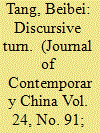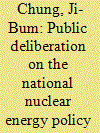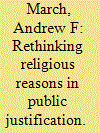|
|
|
Sort Order |
|
|
|
Items / Page
|
|
|
|
|
|
|
| Srl | Item |
| 1 |
ID:
117315


|
|
|
|
|
| Publication |
2013.
|
| Summary/Abstract |
The adaptation and transition to new configurations of energy systems brought on by challenges of climate change, energy security, and sustainability have encouraged more integrative approaches that bring together the social and technical dimensions of technology. The perspectives of energy systems and climate change play an important role in the development and implementation of emerging energy technologies and attendant policies on greenhouse gas reduction. This research examines citizens' views on climate change and a number of energy systems, with a specific focus on the use of carbon capture and storage (CCS) as a technology to address greenhouse gas emissions. An all-day workshop with 82 local participants was held in the city of Calgary in Alberta, Canada to explore the views of climate change, energy and CCS. Participants were provided the opportunity to ask experts questions and discuss in small groups their views of climate change policy and energy systems. Results demonstrate that participants' assessments of energy systems are influenced by social-political-institutional-economic contexts such as trust in industry and government, perception of parties benefiting from the technology, and tradeoffs between energy systems. We discuss our findings in the context of understanding social learning processes as part of socio-technical systems change.
|
|
|
|
|
|
|
|
|
|
|
|
|
|
|
|
| 2 |
ID:
137368


|
|
|
|
|
| Summary/Abstract |
This article examines local governance and citizen participation in China through unstructured public deliberation. Case studies from two urbanized villages show that unstructured, informal public deliberation potentially leads to more autonomy and diverse channels for pursuing citizens' appeals at the local level, along with increased consideration given by local government to grassroots requests relating to practical governance matters. Although taking place outside formal political institutions, unstructured public deliberation can exert influences on policy or decision-making inside government organizations through well-coordinated transmission mechanisms between the public and the local government. During this process, well-resourced community organizations and actors play a vital role through their bridging functions to produce dynamic relations of deliberative governance. This bridging role serves to deliver deliberative outcomes from the public sphere to the decision-making authorities, and it also includes the collection of feedback on policy as well as the means to negotiate for policy adjustment by facilitating a policy implementation process.
|
|
|
|
|
|
|
|
|
|
|
|
|
|
|
|
| 3 |
ID:
174978


|
|
|
|
|
| Summary/Abstract |
Successful transition of a nation's energy policy requires widespread engagement from all sectors of the society, including the public. The government of the Republic of Korea conducted a deliberative polling to decide whether to resume nuclear power plant construction in response to the conflicts in the construction of the new Shin-Kori nuclear power plants in 2017. This study reports the findings of a quantitative analysis of the process and the results of the deliberation. Although the respondents supported the resumption of the construction, they favored the reduced use of nuclear power in the future. Despite the intensive deliberation process, most people did not change their initial opinions; rather, they tended to make judgments based on their values, especially their political ideologies. However, the Korean deliberation process did show signs of small success. Although the participants did not change their original opinions completely, they became more sympathetic to the opinions of the other side of the debate, suggesting the possibility of a democratic energy transition.
|
|
|
|
|
|
|
|
|
|
|
|
|
|
|
|
| 4 |
ID:
127804


|
|
|
|
|
| Publication |
2013.
|
| Summary/Abstract |
This article intervenes in the debate on the place of religious arguments in public reason. I advance the debate not by asking whether something called "religious reasons" ought to be invoked in the justification of coercive laws, but by creating a typology of (a) different kinds and forms of religious arguments and, more importantly, (b) different areas of political and social life which coercive laws regulate or about which human political communities deliberate. Religious arguments are of many different kinds, are offered to others in a variety of ways, and the spheres of life about which communities deliberate pose distinct moral questions. Turning back to the public reason debate, I argue then that political liberals ought to be concerned primarily about the invocation of a certain subset of religious reasons in a certain subset of areas of human activity, but also that inclusivist arguments on behalf of religious contributions to public deliberation fail to justify the use of religious arguments in all areas of public deliberation.
|
|
|
|
|
|
|
|
|
|
|
|
|
|
|
|
|
|
|
|
|